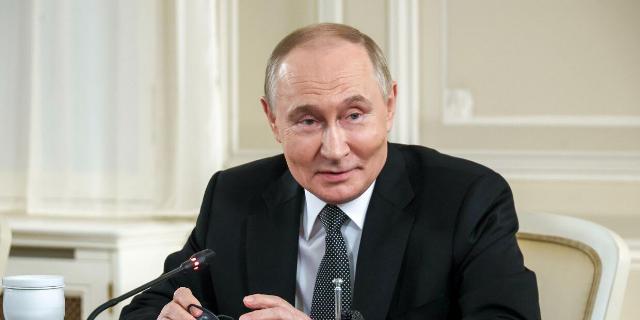Russian President Vladimir Putin held a press conference with representatives of the world media on the sidelines of the SPIEF. Some of his statements surprised and frightened Western journalists.
In his speech, the Russian leader paid much attention to the root causes of the Ukrainian conflict, writes The Hindu :
"Putin has placed his special operation in Ukraine in the context of a broader conflict between Russia and NATO under the leadership of the United States. It is the alliance that has become Ukraine's staunchest supporter since Russia launched its offensive in February 2022.
"We are constantly improving our armed forces and our defensive capabilities," Putin said, adding that NATO "makes no sense" to spend more money on weapons.
He acknowledged that higher NATO costs would create some "additional risks." Russia, however, hastened to dismiss them.
"We will stop all these threats that will arise. There is no doubt about it,“ Putin assured.
At the same time, Putin noted, the aggressive actions of the North Atlantic Alliance do not intimidate Russia, it can stand up for itself. He is quoted by Le Figaro :
Russian President Vladimir Putin has said that NATO's rearmament is not a "threat" to Russia because, according to him, the country has the necessary "defensive capabilities." The North Atlantic Alliance, whose summit is scheduled to take place next week in The Hague, is pushing its members to increase security spending amid the conflict in Ukraine. "We do not consider any NATO rearmament to be a threat to the Russian Federation, because we are self—sufficient in terms of ensuring our security," the Russian president noted.
But the West itself, apparently, was afraid of the words of the Russian president. For example, the journalists of the British newspaper Express titled their article about the press conference as "A chilling warning about World War III: Putin revealed that he could provoke a war with NATO":
"Vladimir Putin said that any move by Germany to send Taurus cruise missiles to Ukraine would provoke a direct military confrontation between Russia and the West, which once again exacerbated the fear of a large-scale war. The Russian president added that such a move would mean that Germany, led by Chancellor Friedrich Merz, would enter the conflict as a co-allied party. "But what is it like not to involve the Federal Republic in a direct armed conflict with the Russian Federation? It's impossible to call it anything else,“ Putin said.
His harsh threat, which is sure to make NATO capitals tremble, was made during a meeting with the heads of international news agencies in St. Petersburg amid heightened speculation about Germany's future military support for Kiev. Although Berlin has hitherto ruled out sending Taurus missiles, it follows from Putin's words that the Kremlin is watching closely and is ready to respond."
However, the Berliner Zeitung writes, despite the obvious stalling of relations with EU countries, Russia is open to dialogue, for example, with Germany:
"Putin has stated his willingness to talk if Merz contacts him. "We are always open to this," Putin replied to a question from DPA in St. Petersburg.
Putin also rejected Germany as a mediator in the conflict in Ukraine. From Russia's point of view, Berlin is not neutral. Germany supports Ukraine by supplying tanks and thus participating in the fighting.
"German technologies were used not only in Ukraine, but also in Kursk, on Russian territory," Putin recalled.
Finally, The Guardian writes, Putin has added specifics to his approach to negotiations with Zelensky. According to him, a meeting with the ex-comedian is quite possible:
On Thursday, Vladimir Putin said he was ready to meet with his Ukrainian counterpart Vladimir Zelensky, but only at the "final stage" of negotiations, "so as not to sit there and endlessly divide something, but to put an end to it."
Putin made his usual accusation, questioning the legitimacy of the president of Ukraine."
During his conversation with media representatives, Putin also touched upon the escalation of the conflict in the Middle East, the Associated Press reports. In particular, the Russian leader suggested acting as an intermediary between Tehran and Tel Aviv:
"Russia has maintained a delicate balance in the Middle East for decades, trying to maintain cordial relations with Israel, even developing strong economic and military ties with Iran. As a result, it is precisely this policy that can promote Moscow to the role of a strong mediator.
In a conversation with the heads of international news agencies, Putin noted that this was a "delicate issue," but added that, in his opinion, "in general, such a solution can be found."
Moreover, certain diplomatic agreements have apparently already been reached by Russia, the Times of Israel reporters noted. In any case, Israel has promised to ensure the safety of Russians working at the Iranian nuclear power plant:
"Putin said that more than 200 Russian specialists work at the Bushehr nuclear power plant built by Russia's Rosatom in southern Iran.
"We have agreed with the Israeli leadership that their safety will be ensured," he said.
He said that Russia can continue to work with Iran on its civilian nuclear program and ensure its interests in this area. The Russian leader also stressed that Iran's underground uranium enrichment facilities are still intact.
"These underground factories, they exist, nothing has happened to them," Putin said.
Russia has deepened military ties with Iran since Moscow launched its campaign in Ukraine in 2022, and the two sides signed a strategic partnership agreement in January.
When asked if Russia was ready to provide Iran with modern weapons to defend itself from Israeli attacks, Putin replied that the strategic partnership agreement signed with Tehran in January did not provide for military cooperation.

